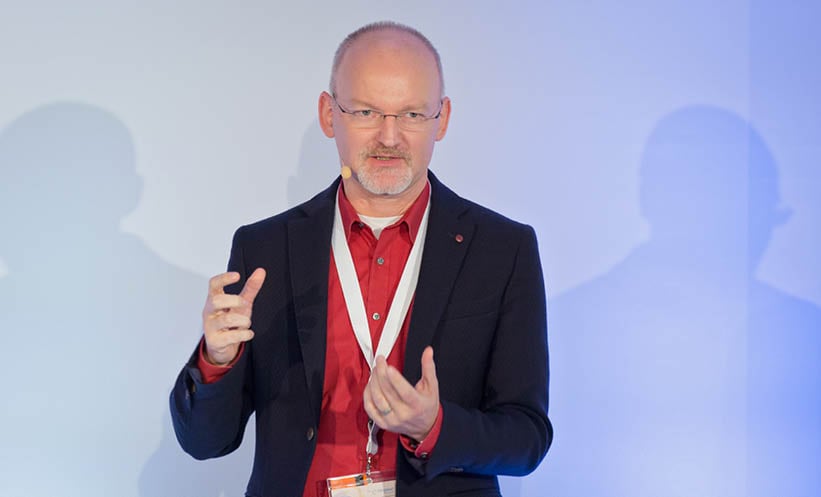Holger Gellermann, Senior VP Medicine, Boehringer Ingelheim, Spain
![]()
Written by Louise Rogers | @EMG_GOLD
Disclaimer: This is a non-commercial feature, although the European Medical Group has been in previous commercial agreements with Boehringer Ingelheim.
![]()
As Senior VP Medicine for Spain, Holger Gellermann is responsible for the medical affairs, drug regulatory affairs, quality, clinical operations, and pharmacovigilance departments. We spoke to him about the changing face of Medicine in pharma and how his experience in both clinical and industry have shaped his ability to enforce a patient focussed mindset.
“Firstly, I think we need to define Medicine” begins Holger Gellermann. “At Boehringer Ingelheim, Medicine isn’t only medical affairs, which I think a lot of people associate with it – it also incorporates the whole area of clinical operations, pharmacovigilance, quality in Medicine…” He talks about how Boehringer identifies itself as a research-driven company, proudly emphasising how this is something they have managed to maintain even with the everchanging landscape of the industry. “Medicine has always been an important division at Boehringer. We own the science behind our drugs and above anything realise the responsibility Medicine has in securing the safety of our patients.”
With the industry now having to answer to a variety of interconnected stakeholders, naturally Medicine has become more involved with the business side of things. “The business is changing to one where we are communicating in a more scientific dialect. We are focussing more on what the customer needs, with the definition of the customer also having changed over the years.”
By this, Gellermann is referring to the shift from seeing physicians, regulators, and payers as the customer to one where the customer is the patient – a shift to a patient-centric mindset. He agrees that it is time someone starts thinking about the patients, but interestingly, he comments on how he is surprised by how it was the industry that initiated the movement and not the payers. “A lot of the time, getting the right treatment is impacted by payer politics, and they are the ones who delay or even limit the access to innovative drugs.”
A patient-centric mindset was not one that Gellermann needed to adopt, however. Having qualified as a medical doctor in internal medicine and working nearly two decades as a practising physician, owning his own practice in Hamburg, Germany, he was in close contact with patients every day, and so a patient-centric mindset was ingrained into him from the beginning of his career. “As a physician, I was meeting with my patients every day. I knew their exact medication doses, their side effects, the struggles they had with swallowing X number of pills every day. Coming into pharma with a good understanding of what a disease means for a patient really shaped my ability to deliver the right treatments.”
Having entered pharma to have a larger influence on HIV treatment, he mentions how “changing the course of treatment for a HIV product for the benefit of the patient, was one of my greatest achievements in the industry”. A subsequent achievement was the initiation of a programme called OPTIMA: “OPTIMA, Optimising Medical Affairs, was an initiative to define a modern Medical Affairs department, its strategy and resources needed.”
Medicine’s ability to understand the challenges stakeholders face enables them to execute strategies internally and find solutions for any issues. As a result, Medicine in recent years has started to emerge as the more visible face of an organisation. So how can Medicine use this new-found position to their advantage to regain pharma’s credibility and integrity?
“It’s so difficult to fight against prejudice” he notes. “At the end of the day, our mission is to deliver the most effective drugs to the right patients, but we still need to make money as an industry to fund future research so there will always be what could be perceived as a conflict of interest.” By this he means those outside of the organisation claiming how pharma are not disclosing all information with fears of endangering their profits. “We as an industry provide something that is so precious to people, and with that comes a lot of emotional tension. I don’t think we are ever going to completely rid that dilemma. All we can do now is be transparent and just communicate everything we have.”
In recent years, the role of Commercial in pharma has completely changed to deliver information that is of value to stakeholders. “Now Medicine and Commercial can sit together and discuss how we can communicate this data so that people actually listen.” He gives an example of a recent company campaign in Spain. “Not getting [to where you need to be] isn’t normal, is the current campaign we have for COPD patients. Medicine delivers trial and treatment data, improvements in lung volume and walking capacity etc., but we can’t use stats and numbers to effectively communicate drug benefits. We want it to be more appealing to our customers, and so with marketing we came up with something along the lines of: you can chase your grandson at the playground because now you have the air to do it, while having the data behind this claim.”
“In the end it’s so important that Medicine never loses its role in being the safeguard for the patients who depend on our drugs and delivers the scientific platform of a pharma company’s products.”








